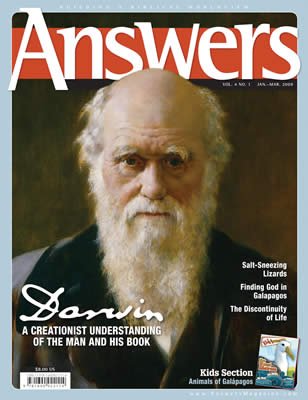
English Heritage Photo Library
Darwin’s Personal Struggle with Evil
The doctor tries to look away as he says, “I’m sorry. I’ve done all I can. Your daughter is dying.”
How would you respond? “God, this is hard to bear. Please give me eyes to see from Your perspective. Take my despair and turn it into joy.” Or would you say, “God, why are you doing this to my family; what has this little girl done to deserve this?” Even born-again Christians struggle with pain and suffering.
But what if you had never placed your personal faith in Jesus Christ? Would you be more inclined to cry out, “What kind of God are You? This is all Your fault. I’m not sure I can still believe You exist.”
That was Darwin’s situation. He was 42 years old and his 10-year-old daughter, Anne, who had developed such a strong emotional connection with him, the joy of his life, lay dying. Her physical trauma hadn’t appeared suddenly. Less than a year earlier, she developed a stomach illness like the one that had plagued him for 12 years. But hers was more severe, more feverish, came more often, and lasted longer. Likewise, doctors were puzzled by its cause. He took her to the health retreat where he had received the most help, but she found no relief.
At the end he stayed close at her side, at times relapsing into his own illness. After days of writhing with agony, she wasted away and passed into a coma before slipping irretrievably from her sobbing father.
Darwin’s faith was not in Jesus Christ, only in what he could see, touch, and understand. Perhaps more than any other scientist of his time, this hurting father came to understand the evil that really exists in the natural world—“red in tooth and claw” as the poet Lord Tennyson described it. The death of Anne just made the evil touch him personally. As far as we know, it also made him turn away from God once and for all.
Just how profoundly he came to reject God is evident from this private message to his family, penned late in life and intended to be read after his death: “I can indeed hardly see how anyone ought to wish Christianity to be true; for if so the plain language of the text seems to show that the men who do not believe, and this would include my father, brother and almost all my best friends, will be everlastingly punished. And this is a damnable doctrine.” Apparently, he understood the New Testament doctrine of salvation through the substitutionary death of Christ but did not believe it.
The blame for his turning away must fall partly on the church and the theologians and scientists who, decades before Anne’s death, had already given up a biblical view of history. Adam’s Fall and the Flood no longer had meaning as real events that shaped our world. The church foolishly explained that God created parasites to prod men to cleanliness, and mice to feed cats. The cat’s capture of a mouse makes both the cat and the mouse “happy.”
Without the Bible’s explanation that Adam’s sin brought death and a curse on the world, there is no satisfying answer to why evil exists.
Without the Bible’s explanation that Adam’s sin brought death and a curse on the world, there is no satisfying answer to why evil exists. We also have no logical foundation to explain why Jesus needed to come to earth as a divine “second Adam” to defeat death (Romans 5:12–14; 1 Corinthians 15:44–49). The church failed to give Darwin a satisfying answer for the sight of a snake devouring a fallen baby bird or the pain of losing his daughter. Those in the church who claimed that God brought Adam’s “very good” world into existence through millions of years of death and suffering made God out to be an ogre and a liar.
Darwin simply was unable to resolve suffering and death with a God who is good, just, and merciful. For him, the “Creator” was distant, caring little whether the world was very good or very bad. Rejecting the biblical view, he reasoned that death and suffering were integral to operation of the present world and had always existed.
Darwin proposed a new natural law—natural selection—which assumed that death has operated from the beginning. With this naturalistic, impersonal force of natural selection, he found a substitute for the God of the Bible, who is the Creator of all life-forms, the eternal Judge of sin, and the only possible Redeemer of fallen mankind and of our corrupted world.
For more information about Charles Darwin, see this list of additional resources:
Answers Magazine
January – March 2009
2009 is “the year of Darwin”— the 200th anniversary of his birth and the 150th anniversary of The Origin of Species. Learn what drove this man to develop his controversial belief system and read leading creationists as they share what we’ve discovered after 150 years of analyzing Darwin’s “dangerous idea.”
Browse Issue
Answers in Genesis is an apologetics ministry, dedicated to helping Christians defend their faith and proclaim the good news of Jesus Christ.
- Customer Service 800.778.3390
- Available Monday–Friday | 9 AM–5 PM ET
- © 2025 Answers in Genesis


